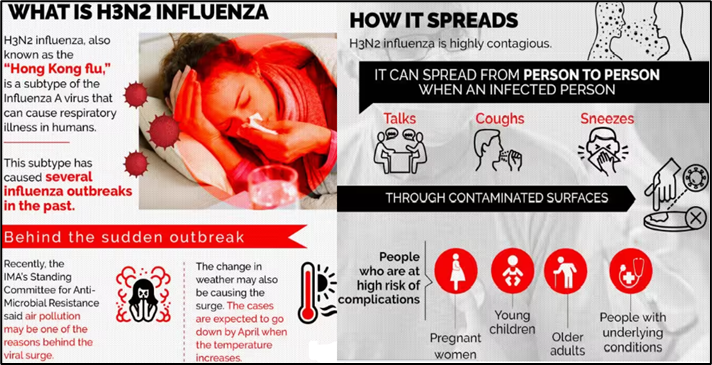ForumIAS announcing GS Foundation Program for UPSC CSE 2025-26 from 19 April. Click Here for more information.
ForumIAS Answer Writing Focus Group (AWFG) for Mains 2024 commencing from 24th June 2024. The Entrance Test for the program will be held on 28th April 2024 at 9 AM. To know more about the program visit: https://forumias.com/blog/awfg2024
Contents
Source: The post is based on the article “H3N2: What is this virus and how can it be prevented from spreading” published in Indian Express on 11th March 2023.
What is the News?
India has recorded deaths of two people, one each in Karnataka and Haryana due to the Influenza A subtype H3N2 virus.
What is H3N2 Virus?

Influenza viruses, which cause the infectious disease known as flu, are of four different types: A, B, C and D.
Influenza A is further classified into different subtypes and one of them is H3N2.
According to the United States’ Centers for Disease Control and Prevention (CDC), H3N2 caused the 1968 flu pandemic that led to the death of around one million people globally and about 100,000 in the US.
What are the symptoms of H3N2?
Its symptoms are similar to that of any other flu. They include cough, fever, body ache and headache, sore throat, a runny or stuffy nose and extreme fatigue. Nausea, vomiting and diarrhoea have been seen in very few cases.
How does the virus spread?
H3N2 influenza can be transmitted from one person to another through droplets released when coughing, sneezing, or talking by an infected individual. It can also spread if someone touches their mouth or nose after contacting a surface that has the virus on it.
Pregnant women, young children, elderly adults, and persons with underlying medical issues are at a higher risk of flu-related complications.
What is the treatment?
Taking proper rest, drinking lots of fluids and using over-the-counter painkillers like acetaminophen or ibuprofen to lower fever are all part of the H3N2 influenza treatment regimen.
If a patient has severe symptoms or is at a high risk of problems, a doctor may also recommend antiviral drugs such as oseltamivir and zanamivir.




